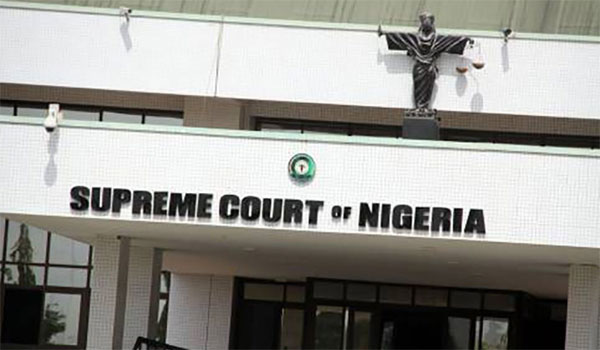FOLLOWING a stinging rebuke of the quality of judgments coming from the Court of Appeal, by the Supreme Court, judicial stakeholders are expressing worries about the future of the apex court.
Sunday Tribune understands that the top Bench, since the return to civil rule, has been sourcing its judicial personnel, mainly from the intermediate Bench.
But on Friday, while reversing the sacking of three governors by the Court of Appeal, the apex court descended on the lower court and berated the quality of its interpretation of the law in political cases.
In reversing the Court of Appeal’s judgment that removed Governor Caleb Muftwang of Plateau State, Justices Helen Ogunwumiju and Adamu Jauro excoriated the appelate court for shifting the burden of proof on the governor.
“It was very wrong for the Court of Appeal to go into the issue of party congresses. To make matters worse, the party challenging the issue is another political party,” Ogunwumiju remonstrated.
A subsisting Supreme Court precedent in Akeredolu v Jegede says even if a party contravenes its rule in picking its candidates, other parties can’t challenge the process, because it remains the internal affair of the affected party.
In the same Plateau matter, Justices Emma Agim and Inyang Okoro, further piled on the error of the Court of Appeal in sacking the governor, with Agim tellingly saying “the legal profession should wake up.”
Obviously mourning National Assembly and Plateau House of Assembly members sacked by the Court of Appeal on the same wrong premises used in sacking the governor, Justice Okoro said, “My only worry is that a lot of people have suffered as a result of the Court of Appeal’s decision. It was absolutely wrong.”
The Court of Appeal is the final arbiter in National and House of Assembly polls.
Despite the harsh criticism, justices of the court below are about to become the majority in the Supreme Court, once the 11 justices, cleared by the Senate on December 21, 2023, are sworn-in by President Bola Tinubu.
The elevated 11 justices are expected to join the current 10 justices of the apex court, which include the Chief Justice, Kayode Ariwoola, to unprecedentedly, reach the constitutional threshold of 21.
The old set of justices is already in the minority and the imminent retirement of Ariwoola, on August 22 this year, is going to further deplete it.
If Ariwoola’s expected successor, Justice Kudirat Kekere-Ekun keeps to tradition, the Court of Appeal will still produce a replacement, increasing the number of the new set to 12.
Among those already cleared for ascension to the apex court is Justice Moore Adumein from Bayelsa (South-South), who wrote the conflicting lead judgment in the appeal court case that sacked Kano State governor, Abba Yusuf.
Apart from overturning the unanimous judgment prepared by Adumein, Justice Okoro, who led the apex court panel, directly addressed the sloppiness at the lower court which led to victory being simultaneously awarded to the disputing parties.
He said: “Judges should be more meticulous in doing their job, no matter the pressure. This is to avoid the mess that happened at the court below.”
Incidentally, like Okoro, Adumein is going to lead the apex court at some point in the future.
While Okoro is expected to succeed Kekere-Ekun if the succession-by-seniority arrangement is preserved, Adumein, according to seniority and age, is expected to lead the apex court for four years and nine days, between April 27, 2030 and May 6, 2034.
Despite repeated efforts, the Bar has been unsuccessful in getting senior lawyers appointed to superior courts of record, especially the Supreme Court.
At a recent public function with President Tinubu where the Senate President, Godswill Akpabio, was also in attendance, a former president of the Nigerian Bar Association (NBA), Olisa Agbakoba SAN, lamented the presence of a cabal in the Supreme Court that deliberately keeps senior lawyers away from being appointed to the bench.
According to him, “I was the first, accompanied by my brother, Wole Olanipekun, to apply because we thought we were qualified to sit at the Supreme Court. The mafia there threw us out.”
He subsequently called on Akpabio to lead the federal lawmakers to make laws for the appointment of senior judges in the country.
Apart from Adumein, other elevated justices of the court below had also taken up election adjudication duties, though not as rancorous as his.
Justice Mohammed Baba Idris, son of the late Chief Justice Idris Kutigi, also in the Adumein class, was part of the appeal court panel that gave a unanimous victory to Governor Uba Sani, to properly resolve the controversial majority decision of the tribunal.
He is also in the succession line, and will rule for five years and four months, between June 17, 2035 and October 25, 2040, if the current arrangement stays.
He is also expected to spend 17 years as a justice of the apex court.
Meanwhile, close to a month since their Senate clearance, President Tinubu is yet to green-light the swearing in of the promoted justices despite the urgent calls by stakeholders, including the chief justice, to have the apex court replenished.
Sunday Tribune learnt that they are likely kept off the apex bench for the governorship cases they superintended at the Court of Appeal, to be done with at the Supreme Court, since they can’t sit on appeal on cases they determined.
All cases relating to the 2023 general election are expected to be dispensed with by the end of January, according to the extant laws guiding the electoral process.
This week may also present another potentially-embarrassing moment for the Court of Appeal as the Nasarawa gubernatorial dispute will be resolved by the apex court on Tuesday.
Recall that the tribunal had handed victory to the candidate of the Peoples Democratic Party (PDP), David Ombugadu, only for the Court of Appeal to reverse it, handling Governor Abdullahi Sule, a lifeline.
